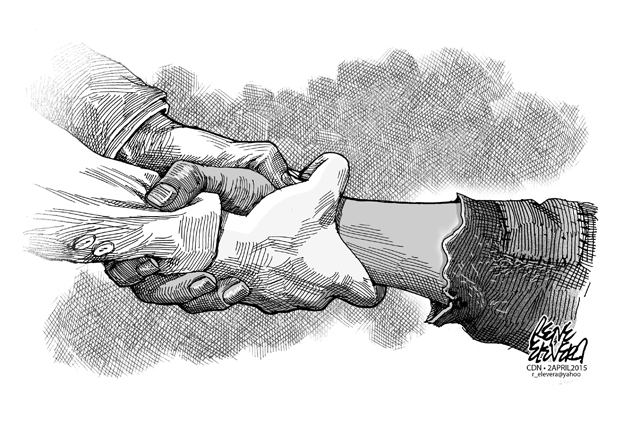
Cebu Archbishop Jose Palma’s appeal in a recent Mass for the faithful to “commune with the poor”, not just by donating an amount but by spending time with the ones they set out to help, is a lesson for everyone, regardless of religious or personal belief.
He suggested that those with more than they need in material goods should spend time with the less fortunate.
“We should eat with the poor. We should sit down and share food together. This gesture is a reminder that we are one big family in Christ,” he said.
“Poverty has many faces and names. We need to be sensitive to the needs of other people. Let us not ignore them,” Palma told those attending a Lenten recollection at the San Pedro Calungsod chapel last month.
Genuine interest in uplifting the lives of the needy means giving without looking for a “selfie” moment or counting potential votes for a run in public office.
With the 2016 election coming up, w won’t be surprised if the number of local and nationally elected officials seen and heard visiting slum areas to be photographed mingling and handing over assistance to indigents will increase ahead of the official election season in October.
And it’s not as if the poor aren’t taking advantage of the friendlier-than-usual approach of politicians. They ask for an assortment of material benefits, though most of them simply ask people in power to give them a chance to improve their lives and their future.
It’s no wonder that social workers and church volunteers, missionaries and those in the front lines who actually spend time in poor communities have a more solid base of support among indigent settlers.
It’s this kind of rapport that Palma may be referring to when he called on others “to commune with the poor.”
It’s more than giving up coins to street children stretching out their palms.
It’s more than dropping more coins and paper bills in the weekly “collecta” at Mass.
The real currency of solidarity with the poor is one’s presence and precious time. From that position, one can listen correctly to what is needed, and draw from one’s conscience and one’s treasure, what is needed to the point of genuine sacrifice.
Like Pope Francis is fond of reminding all do-gooders, “I don’t believe in charity that doesn’t hurt.”